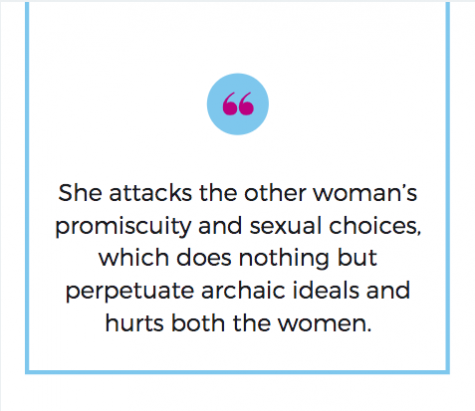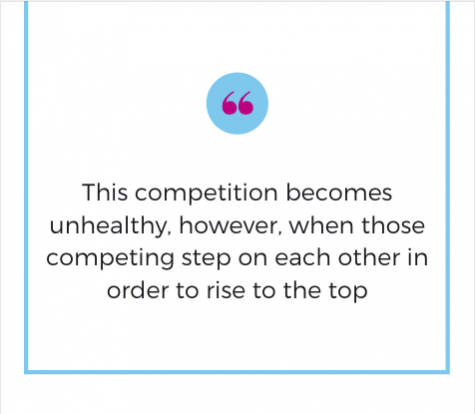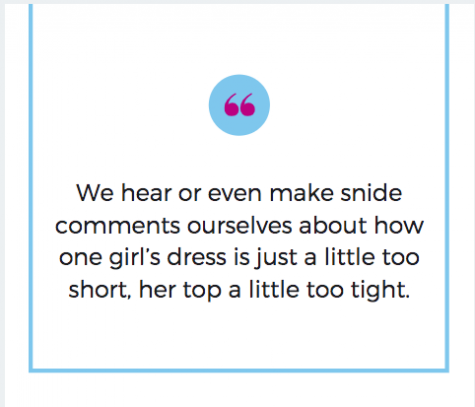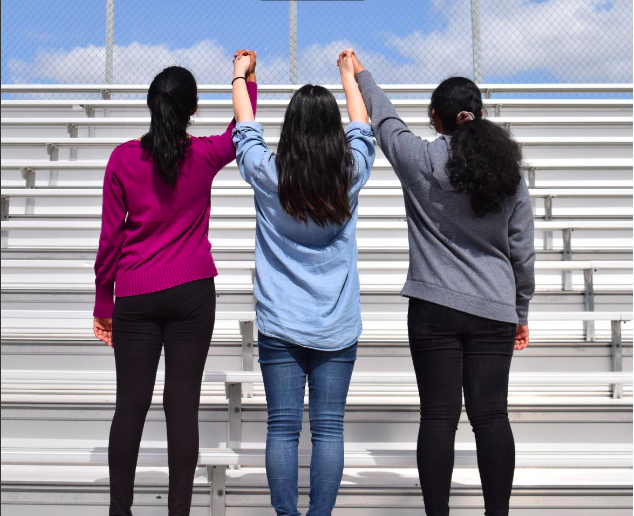Empowered Women Empower Women
We need to stop pitting women against each other
May 22, 2019
The rise of the 21st Century has brought in a generation that is more aware, sensitive and progressive in relation to issues that have been plaguing our country for years — more specifically, in support of women’s rights and ways of empowerment. Women’s employment rates and college graduation rates are at an all time high, according to U.S. News and the Bureau of Labor Statistics. We have slowly but surely climbed the rungs of success, with a record number of 102 women in Congress, according to the Pew Research Center. The feminist movement has grown over the years, especially in pop culture and media, and brought with it widespread messages of empowerment and inclusivity.
That’s not to say pop culture and revered feminist icons don’t perpetuate messages of internalized misogyny. In her 2010 album “Speak Now,” Taylor Swift reflected on a past relationship that she says was “stolen” from her in the song “Better than Revenge.” The song features lyrics such as “She’s not a saint / And she’s not what you think / She’s an actress, / She’s better known / For the things that she does / On the mattress.”
She attacks the other woman’s promiscuity and sexual choices, which does nothing but perpetuate archaic ideals and hurts both the women. Taylor later apologized for the lyrics, saying “I was 18 when I wrote that. That’s the age you are when you think someone can actually take your boyfriend. Then you grow up and realize no one can take someone from you if they don’t want to leave,” according to Rolling Stones reporter Brittany Spanos.
She has since become an outspoken advocate for women’s rights and female empowerment, including suing a radio DJ for one dollar for sexual misconduct in order to make a statement. She has also sympathized with women who’ve come forward in the #MeToo movement, learning from her mistakes and overcoming some of the sentiments of internalized misogyny she held.
Slut-shaming sentiments still remain in the media and in pop culture, however. Particularly in the arena of females in rap. The recent feuds between Cardi B and Nicki Minaj only perpetuate the narrative of women putting down other women in the entertainment industry.
As Vox reporter Alex Abad-Santos pointed out, “when it comes to the mainstream consumption of female-driven hip-hop, there seems to exist an irrational paradigm that reads like a crooked fairy tale: There can only ever be one dominant female rapper of the moment.” Feuds between male artists and rappers, such as the conflicts between Drake and Meek Mill, aren’t as publicized or glorified, and it seems as if audiences are more likely to pit women against each other, rather than men.
Competition in any industry is healthy. It drives progress and pushes people to strive and achieve to the best of their ability. This competition becomes unhealthy, however, when those competing step on each other in order to rise to the top. The trope of girls competing and putting each other down just to “win” a man over is seething with prevalence in films and other forms of media.
 The Bechdel test, a test popularized by Alison Bechdel’s comic “Dykes to Watch Out for,” is a test which sees whether films and TV shows follow three simple criteria: they feature at least two women, who talk to each other, about something other than a man. The trope of women “competing” for a man is even more prevalent, and many of our favorite movies don’t pass this simple test. Even in beloved movies such as “Mean Girls,” this trope of women putting each other down and slut-shaming other women in a “Burn Book” pervades the movie. Though at the end, the heartwarming message of acceptance and kindness is made, it’s still somewhat undercut by the obvious slut-shaming and unsettling themes prevalent throughout the movie.
The Bechdel test, a test popularized by Alison Bechdel’s comic “Dykes to Watch Out for,” is a test which sees whether films and TV shows follow three simple criteria: they feature at least two women, who talk to each other, about something other than a man. The trope of women “competing” for a man is even more prevalent, and many of our favorite movies don’t pass this simple test. Even in beloved movies such as “Mean Girls,” this trope of women putting each other down and slut-shaming other women in a “Burn Book” pervades the movie. Though at the end, the heartwarming message of acceptance and kindness is made, it’s still somewhat undercut by the obvious slut-shaming and unsettling themes prevalent throughout the movie.
The portrayal of women putting down other women in media is just a microcosm of this hate in the real world. We’ve all been victim to internalized misogyny. We hear or even make snide comments ourselves about how one girl’s dress is just a little too short, her top a little too tight. We hear girls talk about how they’re “not like other girls”, how they only hang out with guys because guys cause less drama. We weaponize the sexuality of other women, throwing around the word “slut” as a slur, a bad thing, when in reality a woman has every right to be as sexual or as modest as she wants to. While the male equivalent to this slur is “stud,” praises men, rather than chastising them, for being sexually active.
Over the years, we’ve slowly but surely, become more aware of our own personal biases and internalized prejudices. Campaigns such as social media influencer Lilly Singh’s Girl Love reflect positive messages of women supporting women. Singh, in her video series of the same name, features women of high stature, such as Bebe Rexha, Michelle Obama and Sabrina Carpenter, sharing stories of empowerment and supporting other women. She donates proceeds from her campaign to underprivileged girls in Kenya so they can receive an education.
Messages of positive girl empowerment are starting to show up in pop culture as well, through songs such as “Most Girls” by Hailee Steinfeld, that denounces the “I’m not like most girls” trope, “SLUT” by Bea Miller, reclaiming the insulting slur by claiming the word to be an acronym to stand for “sweet little unforgettable thing” and more. Through supporting people, campaigns and messages such as these, we can work towards breaking down the toxic culture of tearing other women down.
In a world where so much progress has been made in the way of women’s rights, we need to embrace a culture of true, actual empowerment. All of this internalized misogyny only makes it harder for us. This internalization may be a product of our environment, but we need to be aware of the problem in order to fix it. We face enough blatant sexism from men in the workplace, in the classroom and online. If we want to further the progress our country has already made to tackle issues of sexism, women must band together. We need to stop tearing each other down, stop supporting media that perpetuates messages of women stepping on other women to be successful and stop weaponizing another woman’s sexuality: We still have a ways to go to achieve full, actual empowerment.


















